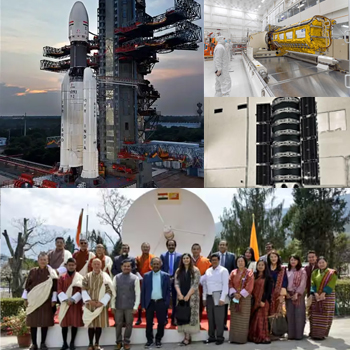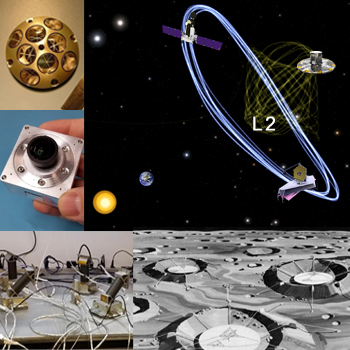India Space Program Forges Ahead with Commercial Launch Service, Lunar Science and Earth Observation
|
MONDAY☆ Mar 20 — ISS, ~415-km LEO: Expedition 68 seven-member crew of 3 Russia, 3 USA, 1 UAE Astronauts begin CRS-27 Dragon Cargo transfers, working with Cellular Immunity experiment, 40+ day Particle Vibration project, Veg-05 Red Robin tomato plants. ☆ Mar 20 — Tiangong Space Station, ~390-km LEO: Shenzhou-16 craft on standby at Jiuquan as Shenzhou-15 emergency back-up while being prepared for May 25 launch with 3-member crew; Tianzhou-6 en route to Wenchang for May 10 launch. Highlights… o NewSpace: Firefly to carry Lunar Pathfinder orbiter and land LuSEE-Night radio astronomy payload on Moon far side under US$112M NASA CLPS award; Axiom Extravehicular Mobility Unit to be used on Artemis missions, fit 90% of USA male and female population, Axiom Mission 3 to launch to ISS Nov 2023; Virgin Orbit operations on pause, employees furloughed as new funding sought. ☆ Solar System: LROC NAC reveals stunning details of Malapert massif near Moon South Pole which may inform Artemis 3 candidate landing if region is selected; University of Alaska Fairbanks Geophysical Institute study of Magellan data suggests recent volcanism on Venus. ☆ Galaxy: 200+ variable RR Lyrae stars identified 1,000,000 ly from Earth in MWG outer halo suggests small gap to Andromeda; JWST set to observe Trappist-1 system this summer, hope to observe transits and detect atmosphere(s) / water vapor; CAS / ESA Einstein Probe wide-field X-ray space telescope on track to launch on Long March 2C Nov 5. o Global: Researchers at Western University (London, ON) considering licensure requirements for the practice of medicine in space; NASA OTPS study finds cost / benefit ratio of orbital debris removal justifies immediate action, net benefit increases over time. ● USA: NASA planning to issue RFP for commercial de-orbiting of ISS expected to cost ~$1B per Associate Administrator Kathy Leuders; SpaceX CEO Elon Musk predicts Starship orbital test will occur in April with 50% chance of success, 80% within 2023; AIAA UAP Integration & Outreach Committee chair Ryan Graves to foster information sharing with organization Americans for Safe Aerospace. ● Hawai’i: The Young Supernova Experiment Pan-STARRS catalogue of ~2,000 supernovae collected over 3-year survey now available to public; Keck observations show ancient gas from ‘Cosmic Noon’ displaying characteristics of current day ‘Warm-Hot Intergalactic Medium’ typically 100,000 – 10M °C. |
 |
● = Terrestrial and… o = International terrestrial events
☾ = Moon activity ★ = Space and… ☆ = International space / astro events in Hawaii Standard Time unless noted. Add 10 hours to obtain UT (‘Universal Time’). |
Weekly Planet Watch – Morning Planets: Saturn (ESE); Evening Planets: Venus (W), Mars (E), Jupiter (W), Uranus (W).
New Space Frontiers for Astronomy
21st Century science and astronomy is rapidly advancing beyond Earth, particularly at 2 promising locations, with pioneering observatories James Webb Space Telescope, Gaia and Spektr-RG orbiting at Sun-Earth L2, and plans for astrophysical instruments to join Chang’E payloads on the surface on the Moon. Gaia operates at L2 in a Lissajous orbit, while JWST and Spektr-RG are in a halo orbit. Sun-Earth L2 offers continuous illumination for solar panels and temperate constants making shielding and calibration for spacecraft more manageable. The stable platform of the Moon recently saw the recurrence of astrophysics with the landing of Lunar Ultraviolet Telescope aboard Chang’E-3 and Low Frequency Spectrometer aboard Chang’E-4 which works with NCLE aboard CE-4 orbiter at Earth-Moon L2. Astrobotic Peregrine 1, hoping to launch to the Moon May 4, is carrying LRA containing 8 retroreflectors for astrometry. Intuitive Machines IM-1 lander, currently set to launch late June, is contracted to fly ROLSES (to help determine the density of the electron sheath of the Moon and detect solar radio bursts, Jupiter radio emissions and radio signals from Earth) and ILOA Hawai’i ILO-X payload (dual astronomy optical imagers to observe the Milky Way Galaxy and the celestial sky). Future global placement of lunar-based telescopes monitoring all wavelengths and expanding VLBI to space & Moon observatories will transform research capabilities. (Image Credits: ESA, Gaia, DPAC, NPO Lavochkin, NASA, GSFC, ILOA Hawai’i, Canadensys Aerospace) |
o Mar 20-31 — United Nations Committee on the Peaceful Uses of Outer Space (COPUOS), Vienna, Austria: Meeting of the Legal Subcommittee of COPUOS. ☆ Mar 20 — March Equinox: The Sun rises exactly in east traveling through sky for 12 hours, sets exactly in west; every place on Earth experiences a ~12-hour day; 11:23. ☆ Mar 20 — Moon: 2.11° SE of Neptune, 23:00. ☆ Mar 20 — Dwarf Planet 1 Ceres: At opposition, magnitude 7.0; 11:00. ☆ Mar 20 — Amor Asteroid 2019 ER1: Near-Earth Flyby (0.085 AU) Continued From… ● Oct 15 – Jun 15, 2023 — International Space Elevator Consortium, Online: Space Elevator Academic Challenge: Improving Humanity’s Future; for students 17-25. ☾ Dec 11 – Apr 25, 2023 — Hakuto-R / ispace Mission 1, Lunar Landing Trajectory: Carrying UAE Rashid 10-kg rover, 0.25-kg JAXA SORA-Q rover, Hakuto-R performing orbital control maneuvers to reach Lunar Orbital Insertion, followed by Moon touchdown nominally ~4.5 months after launch. ● Jan 18 – May 11 — Wichita State University, Wichita KS and Online: 2023 Interstellar Seminar ‘LASI 150G’; 1-credit hour seminar begins today; every Wednesday 14:30-15:20, led by Prof. Mark Schneegurt. ● Feb 27 – Mar 24 — UC Santa Barbara Kavli Institute for Theoretical Physics, Santa Barbara CA: Course: Building a Physical Understanding of Galaxy Evolution with Data-driven Astronomy. o Feb 24 – May 24 — National Museum of China, Beijing, China: Exhibit Featuring China’s Human, Lunar and Space Program. ● Mar 1-31 — NASA, Online / Washington DC: Celebrate Women’s History Month with NASA. TUESDAY☆ Mar 21 — ISS Expedition 68 In-Flight Event , ~415-km LEO: Event with UAE media and UAE Flight Engineer Sultan Alneyadi, 07:20 EDT, live coverage available. ● Mar 21 — Terran Orbital, Online / Boca Raton FL: Terran Orbital Conference Call to Discuss Q4 and Full-Year 2022 Financial Results; 11:00. |
☆ Mar 21 — Moon: New Moon, 07:26; 1.65° SE of Mercury, 17:00.
☆ Mar 21 — Aten Asteroid 2018 FE3: Near-Earth Flyby (0.025 AU)
☆ Mar 21 — Aten Asteroid 2016 HF19: Near-Earth Flyby (0.056 AU)
☆ Mar 21 — Apollo Asteroid 2023 AB2: Near-Earth Flyby (0.084 AU)
WEDNESDAY
★ Mar 22 — Relativity Space, Launch Terran 1 / Demo, LC 16, Cape Canaveral SFS FL: Relativity Space to attempt first orbital launch of Terran-1 (3D printed rocket using methane/LOX propellant) on demo mission dubbed ‘Good Luck, Have Fun’; live coverage available.
● Mar 22 — Space Foundation, Online: Space Matters Webinar Series; panel of experts discuss National Space Council Users’ Advisory Group, 13:00 EDT.
☆ Mar 22 — Moon: 0.59° ESE of Jupiter, 11:00.
THURSDAY
● Mar 23 — Universities Space Research Association (USRA), George Washington University Space Policy Institute, Washington DC: Cis-Lunar Space: Research for Today, Training for Tomorrow.
● Mar 23 — Beyond Earth Institute, Online: Webinar: ‘Making It’ In Space: The Market Potential for Commercial Space Stations — and Its Long Term Implications.
● Mar 23 — National Space Society, Online / Washington DC: Space Forum: Space Solar Power; with John Mankins and Gary Barnhard; 21:00.
o Mar 23 — 1st day of Ramadan (1444 A.H.), Worldwide: Annual observance of Ramadan, lasting 29-30 days from sighting of the crescent Moon to next crescent Moon, ending with arrival of Eid al-Fitr.
FRIDAY
● Mar 24 — STEAMSPACE, Huston-Tillotson University Dept. of Natural Sciences, National Space Society, Moody Foundation, Kepler Space Institute, Austin TX: 7th Annual Cities in Space: Student Competition and Conference 2023.
o Mar 24 — National Science Foundation, NOIRLab, Gemini Observatory, Aura Network, La Serena, Chile: 2023 AstroDay – Chile; 14:00-21:30.
● Mar 24 — Space Resources Roundtable, Colorado School of Mines, Golden CO: Abstracts Due: 23rd Space Resources Roundtable (SRR); being held Jun 6-9.
● Mar 24 – Apr 1 — AIAA, Multiple Locations USA: 2023 Region Student Conferences; taking place in multiple locations in OH, CA, TN, NY, NM.
☆ Mar 24 — Moon: 0.24° E of Venus, 01:00; 1.44° NNW of Uranus, 14:00.
☆ Mar 24 — Apollo Asteroid 2023 AB2: Near-Earth Flyby (0.062 AU)
SATURDAY
☆ Mar 25 — Moon: 1.77° SE of Pleiades, 16:00.
☆ Mar 25 — Amor Asteroid 2016 GL2: Near-Earth Flyby (0.082 AU)
SUNDAY
☆ Mar 26 — ISRO, Launch GSLV Mk III (LVM3) / OneWeb 36, Satish Dhawan Space Centre, India: ISRO to launch next batch of 36 communication satellites for OneWeb constellation.
● Mar 26-30 — American Astronomical Society, Waikōloa HI: 20th Meeting of the High Energy Astrophysics Division; at Hilton Waikōloa Village.
o Mar 26 — Daylight Saving Time (Europe): Change clocks forward 1 hour, from Standard Time to Summer Time.

